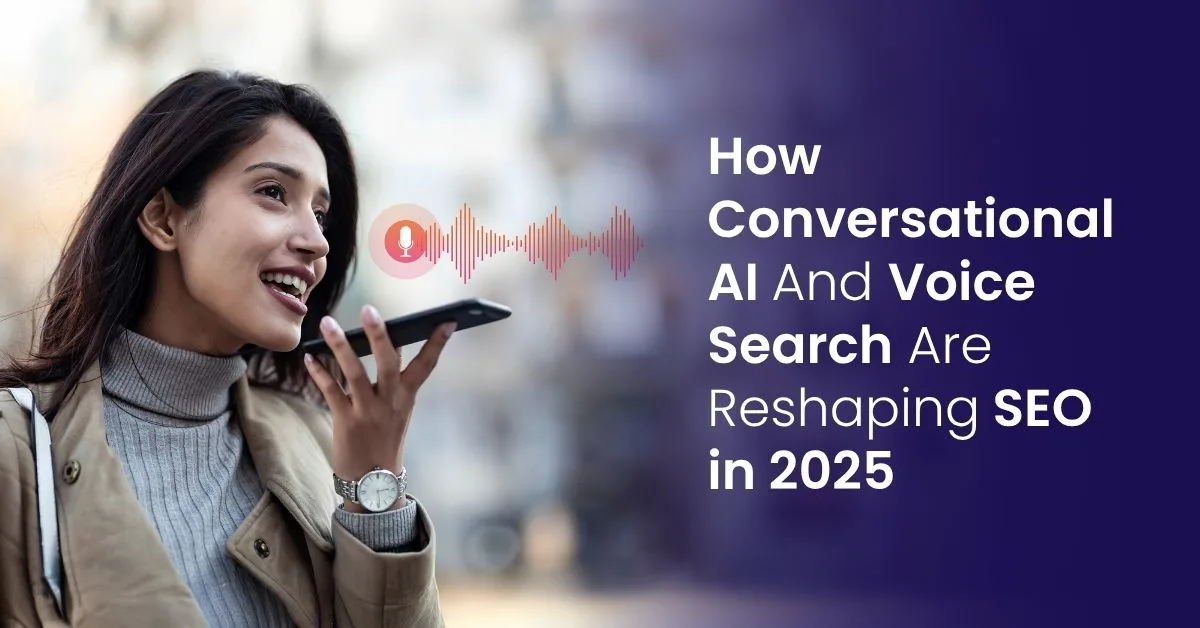5 min read

The way people search online is changing fast.
Typing is fading—talking is taking over.
Today, more users ask smart speakers or voice assistants instead of typing queries.
In 2025, voice search and conversational AI are redefining how marketers think about SEO.
Search isn’t just about keywords anymore—it’s about how people speak.
At Varun Digital Media, we help brands adapt to this voice-first world by combining AI-powered SEO with conversational content that ranks high and sounds natural.
Let’s explore how artificial intelligence, voice technology, and natural language processing (NLP) are reshaping search engine optimization—and how your brand can stay ahead.
Table of Contents
What Does Voice Search Mean for SEO?
Voice search means asking a question out loud instead of typing it into a search engine.
It happens on phones, Google Assistant, Alexa, or any device that understands natural language queries.
Unlike traditional SEO, where users type short phrases, voice search queries are longer and sound more like a real conversation.
For example:
- “Hey Google, what’s the best Italian restaurant near me?”
- “Siri, how do I improve my SEO strategy in 2025?”
These voice queries differ because they reflect real human speech and user intent.
Winning in this space means using conversational language, optimizing with structured data, and writing content that answers questions directly.
Why Voice Search Is Growing Fast
Voice search adoption is growing at record speed.
By 2025, over 60% of users say they prefer speaking over typing (Statista, 2025).
It’s faster, hands-free, and easy.
People use voice search while driving, cooking, or multitasking—and most voice searches happen on mobile devices or smart speakers.
This makes voice search optimization essential for every SEO strategy.
For local businesses, it’s a game-changer.
Most voice users add “near me” or “open now” to find local results.
That’s why your Google Business Profile and local SEO setup must be perfect.
At Varun Digital Media, we’ve helped brands strengthen local intent visibility and boost voice search rankings with AI-driven local optimization.
How Conversational AI Changes Search
Conversational AI makes search engines smarter.
It uses AI-powered tools, machine learning, and natural language processing (NLP) to understand what people mean, not just what they say.
For example, Google’s AI Overviews can analyze search behavior and give voice answers that match user intent.
If someone asks, “What’s the best digital agency near me?” AI interprets “best” based on reviews, ratings, and context.
This level of understanding helps search engines deliver faster, personalized, and more accurate voice search results.
How Voice Search Is Reshaping SEO in 2025
Search in 2025 is more conversational than ever.
Here’s how voice search SEO is changing the game:
1. From Keywords to Conversations
People no longer say “best SEO agency in California.”
They ask, “Which SEO agency in California gives the best results?”
That means content must sound natural and use conversational keywords.
Adopting a conversational tone helps your content fit modern voice search responses.
2. Rise of Long-Tail Keywords
Voice searches are longer and more specific.
Targeting long-tail keywords and natural language makes it easier for search engines to match your answers to real conversations.
3. Direct Answers Win
Voice assistants prefer short, factual responses.
Providing concise answers increases your chance of appearing in featured snippets and Google’s AI Overviews.
4. Structured Data Is Key
Structured data implementation helps search engines understand your pages.
Adding the FAQ schema and the HowTo schema boosts your voice search results visibility.
The Importance of Structured Data in Voice Search SEO
Structured data helps search engines know what your content means.
When you use schema markup, you make it easy for voice assistants to find direct answers.
It enables featured snippets, star ratings, and instant info in voice search results.
In 2025, structured data implementation is not optional—it’s vital for search engine optimization and AI-powered SEO success.
User Intent: The Heart of Conversational SEO
Every voice search query has a purpose—a question, emotion, or need.
AI systems use predictive analytics to study user behavior and understand search intent.
Brands that align their content creation with intent see better engagement and search rankings.
When your answers match what people ask, you increase visibility and voice search success.
How to Optimize for Voice Search in 2025
Want to optimize for voice search? Start with these:
- Use Conversational Language: Write like you speak. Keep sentences short and clear.
- Answer Questions Clearly: Provide direct answers in small paragraphs or lists.
- Implement Structured Data: Add schema markup for FAQs and How-Tos.
- Optimize for Local SEO: Keep your Google Business Profile fresh and accurate.
- Focus on Core Web Vitals: Ensure your site is fast and mobile-friendly.
- Leverage AI Tools: Use AI-powered analytics and Google Search Console to find voice search queries and measure performance.
Voice Search and Local SEO
Most voice searches have local intent.
Users often say, “near me” or “closest to me.”
That’s why local businesses need strong local SEO and accurate NAP details (Name, Address, Phone).
Add photos, service areas, and reviews to your Google Business Profile to increase visibility.
Voice-optimized local pages can double calls and walk-ins for service brands.
The Role of Featured Snippets in Voice Search
When someone asks a question, voice assistants read the top-featured snippet aloud.
To win that spot, your content must be short, factual, and clear.
To improve your chances:
- Answer common questions in 40–60 words.
- Use “how,” “what,” and “why” headings.
- Add structured data to guide Google.
This makes your brand the one Google Assistant selects as the spoken answer.
Multilingual Voice Search Optimization
Search engines now support multiple languages and accents.
With AI-powered tools, you can create multilingual voice search optimization content that reaches global users.
Brands using AI-generated translations and localized long-tail keywords expand across borders, increasing organic traffic and voice visibility.
The Future: AI-Driven Search Engines
The next wave of SEO will be powered by AI-driven search engines.
Tools like Google’s AI Overviews combine voice, visuals, and instant responses.
Future algorithms will rely more on conversational AI and user behavior than backlinks.
That means your SEO strategy must include AI tools, structured data, and content creation that fits natural language processing models.
At Varun Digital Media, we’re already helping brands align with this AI-powered SEO transformation, preparing them for the next decade of digital search.
Why You Need a Voice Search SEO Strategy Now
2025 is the turning point for voice search optimization.
Ignoring it means falling behind competitors already ranking for voice queries.
To stay ahead, your plan must include:
- Voice-first keyword research
- Local intent targeting
- Schema markup
- Fast mobile optimization
- AI-driven analytics and monitoring
These ensure your brand stays visible, conversational, and optimized for the search engines of tomorrow.
Final Thoughts
Conversational AI and voice search are transforming SEO.
Search engines now listen, learn, and respond like humans.
Your content should do the same.
Use a conversational tone, include structured data, and deliver direct answers that sound natural.
In 2025, SEO isn’t about being seen—it’s about being heard.
If your voice matches user intent, Google Assistant and other voice assistants will choose you first.
The future of SEO is AI-powered, human-sounding, and led by forward-thinking agencies like Varun Digital Media.
Brands that adapt today will lead the voice-first internet of tomorrow.
Lead the Voice-First Future
Stay visible as search evolves. Optimize now for conversational AI and voice-focused search experiences.
Published: November 5th, 2025



